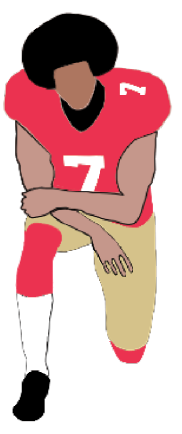If you’re worried about the flag, you’re missing the point
By Tessa Kipke
Michael Brown was just 18 years old when he was gunned down by a white police officer. He was unarmed. Eric Garner was strangled to death in public while repeating “I can’t breathe” over and over again. The police officer who killed him went unpunished. Kendra James was 21 and the mother of two. Philando Castile was 32, and his girlfriend and her young daughter were in the car with him.
These stories of unjust and tragic police brutality against black Americans are disgustingly common and horrifyingly repetitive; they show up constantly in ours news cycle, and the debates that follow are always the same.
Fury, fear, and sadness reignite the voices of black Americans who speak out against the senseless murder of innocents, only to be beaten back by tone-deaf, utterly oblivious white people’s insistences that “all lives matter.” The outpouring of emotion triggers protests, rallies, demonstrations, which, like in Ferguson, Missouri, in 2014, are criticized as being violent overreactions. At the center of it all are the police, who seem to face no consequences for their actions, who wield military-grade weaponry against protesters, and who wear American flags on their uniforms.
I cannot speak for any black Americans, but I know that it’s hard to feel patriotic in a country whose law enforcement actively endangers my fellow citizens.
So, when NFL player Colin Kaepernick began kneeling in protest of police brutality against black men and women during the national anthem in 2016, he was met with both support and an unprecedented level of fury. Football fans, sports commentators, and politicians alike scathingly labelled him unpatriotic and ungrateful for the privilege that his jobs affords him, as though playing professional football some disqualified him from being allowed to peacefully protest.
Here’s the thing, though: Kaepernick doesn’t owe anybody anything. NFL players aren’t obligated to be patriotic; they are employed and paid by a private company, and the right of any American citizen to peacefully protest is thoroughly protected by the Constitution. To call kneeling football players’ actions unpatriotic is to both ignore and contribute to the very problem they are protesting.
It distracts from the message Kaepernick initially meant to send — that he cannot stand up for a country that kills black people thoughtlessly and without consequence — and it drastically quiets his voice as a public figure. Both black and white people have protested inequality and racism for decades, but it is black citizens who are continuously labelled unpatriotic, dangerous, or a threat to the nation in a clear effort to discount their voices (Martin Luther King, Jr., himself was one of the most hated figures in the nation at the time of his death).
The crux of this entire issue isn’t actually patriotism. To take a knee isn’t to disrespect the troops, it’s to help ensure that the values they fight so valiantly to protect — liberty, justice, equality — remain at the forefront of our collective conscience. There is no better way to be a patriot than to fight tooth and nail to make this country better. Let Kaepernick’s original intention not be forgotten: police brutality and racism in the U.S. are problems that make our own citizens feel unsafe, and they cannot be tolerated any longer.
To do nothing when faced with injustice is a bigger insult to our flag and to everything this country stands for than kneeling could ever be. It helps none of us to blindly defend our flag or to sweep the deaths of black men and women at the hands of the police under the rug. So this football season, forget about stars and stripes, empty symbolism that distracts us from why America exists or was founded at all: to protect the liberty and justice of all. Remember that sometimes, dissent is the utmost height of patriotism.

